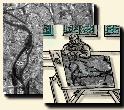 |
 |
![]()
Grouping segments of lineaments seems obvious to a human operator, but
it is not the same for an automatic process. The global vision makes it
possible to easily put end to end segments leading, from a point A, towards
a point B, by respecting criteria of proximity and orientation. In an automatic
process, available information remains very local and it is possible to
aggregate two segments which, although close, do not belong to the same
lineament.
The example below shows a typical case:
 |
The path passing through the bottom segment seems most regular, although it is not shortest.
STEGER and Al [C. Steger, 1997] propose to solve this type of problem, for aerial images, with a method based on fuzzy logic. A graph gathers the possible connections between segments, their opportunity is evaluated by means of three fuzzy criteria, defined in [ 0, 1 ], combined by means of one AND: the absolute distance, the relative distance and collinearity.
Only the minimal value of both is considered. An angle lower than ![]() gives 1, whereas an angle higher than
gives 1, whereas an angle higher than ![]() gives 0.
gives 0.
Such a process gives rather good results, in particular in the slightly built zones. It has the advantage of retaining the segments which prolong the roads coming from outside, and to reject the small streets, thus the crossings of small agglomerations are continuous.
Small occlusions do not seem to pose any problem. For example, a case similar to that presented Figure 16 is correctly treated and the most regular path selected.
A problem remains for crossroads. If the preliminary low-level processing did not detect any ``seed'' point in the crossroads, the process is unable to connect the segments.